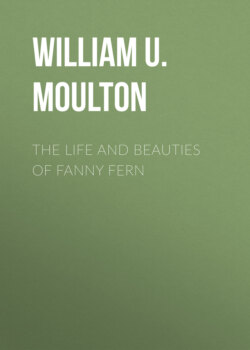Читать книгу The Life and Beauties of Fanny Fern - William U. Moulton - Страница 8
На сайте Литреса книга снята с продажи.
V.
THE SECOND MARRIAGE.
ОглавлениеTable of Contents
Fortunately for the subject of our sketch, her father, though poor, as we have said, hastened to make what provision he could afford for the comfort of the broken family. Nor did Dr. Eldredge turn a deaf ear, or pass by on the other side. Some bitter thoughts were doubtless occasioned, by the remembrance of the luxuries of which she had been so suddenly bereft; it was hard to sink like a star behind the hills of adversity—to pass suddenly from a gay and splendid career into the obscurity of a more common-place and quiet life; and we can excuse the sensitive Fanny for some unreasonable complaints; but, thanks to her own and her husband's father, she had the consolation and treasure of a home—a home, which, however modest, was in every respect comfortable, and not altogether inelegant.
Sarah Eldredge was now in the full flush and vigor of womanhood—and a widow! It is a wise provision of nature which ordains that the most deeply wounded heart shall not always bleed. Hope springs from the ashes of grief. Time buries the dead past, and lifts the curtain from the glowing future. Night comes, that another morning, with all its glory and freshness, may dawn upon the earth. Why then waste the energies of youth in mourning over graves? They will not give up their dead; already the spirit of the lost one looks down upon us from blissful spheres, and says, "Be happy!" to our sorrowing hearts. Such a voice came to the young widow. She called reason and faith to her aid. She saw herself still blooming and attractive; the same inviting world lay all around her; she longed for sympathy, for change, for life. Her first matrimonial venture had proved a happy one; and the memory thereof prompted her to risk another voyage on Wedlock's perilous sea. Thus it might have been the very power of love that bound her to her first husband which threw open the welcoming doors to the advances of a new suitor.
Mr. Farrington, a merchant of Boston—a man of energy and upright character—made an offer of his hand. He had himself enjoyed matrimonial experience—was himself a parent—and was well qualified to sympathize with the young widow. They sought mutual consolation in marriage. But scarce was the honeymoon over, when that mutual consolation was followed by mutual surprise. Fanny learned to her sorrow that all husbands are not equally fond and indulgent; and the bridegroom discovered that Mrs. F. No. 2 wasn't the exact counterpart of Mrs. F. No. 1. The contrast was, in fact, so vast and amazing, that it seemed to require solitude and quiet, to consider it in all its bearings. Accordingly, Mr. Farrington resorted to travel and a change of scene; journeyed westward; and has not since been seen on the down-east slope of the continent. The slender tie of affection between the happy pair, thus long drawn out, like a thread of India rubber, finally snapped.
At the time of his departure, Fanny was boarding with her children at the Marlboro' Hotel in Boston. Soon after, however, she removed to quiet but pleasant lodgings in another quarter of the city.
Mr. Farrington took up his abode in Chicago, and soon after Fanny was connubially advertised in the columns of the Boston Daily Bee. Then, from the auction mart of a western court, Mr. F. gave out three warnings; cried—"Going!—going!!—gone!!!" and legally knocked down his wife with the hammer of divorce.
Once more separated from her husband, the dashing Fanny wore no mourning weeds. Her lively circle of acquaintances found her fireside no less attractive than formerly. Once more a widow she had learned to wear gracefully her honors.
